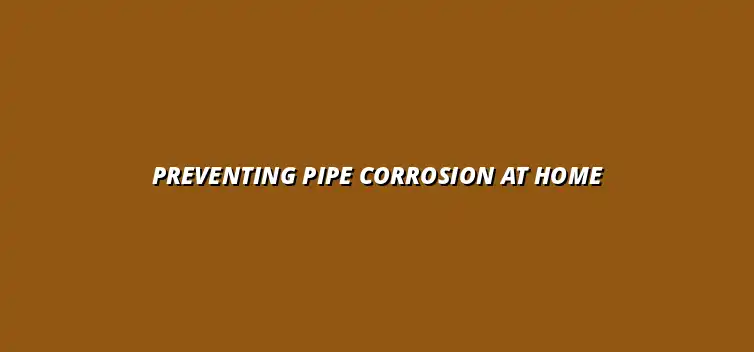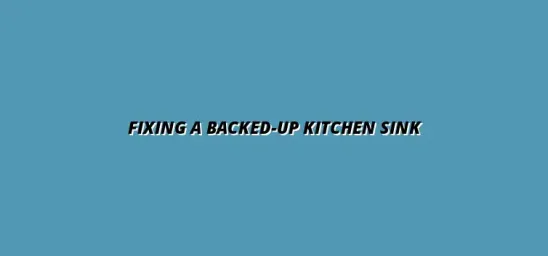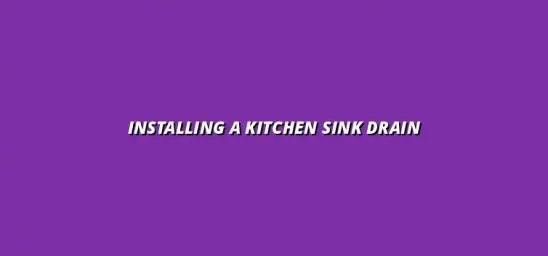
Preventing Pipe Corrosion at Home
Understanding Pipe Corrosion: Causes and Impacts
Pipe corrosion is a significant concern for homeowners, as it can lead to costly repairs and potential hazards. Understanding the underlying causes and effects of corrosion helps us to take proactive measures in protecting our plumbing systems. By addressing the factors that contribute to corrosion, we can maintain the integrity of our pipes and ensure a safe and efficient water supply.
Defining Pipe Corrosion and Its Importance
What Is Pipe Corrosion?
Pipe corrosion refers to the gradual deterioration of pipes due to chemical reactions between the pipe material and the surrounding environment. This process can lead to leaks and structural failures, compromising the functionality of plumbing systems. It's crucial to recognize that while corrosion may be a natural process, its effects can be managed with the right knowledge and strategies!
Why Preventing Pipe Corrosion Is Essential for Homeowners
For homeowners, preventing pipe corrosion is essential for several reasons. Firstly, it ensures the longevity of plumbing systems, reducing the need for expensive repairs. Secondly, it helps maintain water quality by preventing contaminants from entering the supply. Finally, protecting your pipes can save you from unexpected water damage and the associated costs of restoration. Learn more about extending the life of your home's plumbing with these helpful tips: extend your home's plumbing life.
Key Factors Leading to Pipe Corrosion
Chemical Reactions: How Water Quality Affects Pipes
The quality of the water flowing through your pipes plays a significant role in corrosion. Factors such as pH levels and the presence of dissolved minerals can accelerate the corrosion process. Here are some key water quality factors to consider:
- pH Level: Acidic water can corrode metal pipes faster.
- Dissolved Oxygen: Higher levels can lead to rust formation.
- Chlorine Presence: Used for disinfection, it can react with some pipe materials.
Temperature Variations: The Role of Heat in Corrosion
Temperature fluctuations can also affect the rate of corrosion in pipes. Warmer temperatures often increase the reaction rates, speeding up the corrosion process. Homeowners should be aware of these temperature-related factors:
- Hot Water Systems: Can accelerate corrosion in metal pipes. Preventing corrosion in your water heater is crucial; find out how here: preventing corrosion in water heaters.
- Cold Water Systems: Less prone to corrosion but still vulnerable under certain conditions.
- Seasonal Changes: Fluctuations in temperature can impact underground pipes.
Environmental Influences: Soil Composition and External Conditions
The environment surrounding your pipes, especially soil composition, can dramatically influence corrosion rates. Different soil types have varying levels of corrosivity, which can affect underground piping. Key environmental factors include:
- Soil pH: Acidic soils can corrode metal pipes.
- Moisture Levels: Excess moisture promotes corrosion.
- Soil Composition: Certain minerals can be more aggressive toward piping materials.
Addressing Common Concerns and FAQs About Pipe Corrosion
When it comes to pipe corrosion, many homeowners have questions and concerns. Understanding the common issues surrounding this topic can help you stay proactive in maintaining your plumbing system. Here, I’ll cover some frequent questions regarding the signs of corrosion, inspection schedules, and steps to take if you discover corroded pipes. Regular cleaning of your water pipes can significantly reduce the risk of corrosion. Check out these regular water pipe cleaning tips.
What Are the Early Signs of Pipe Corrosion?
Recognizing the early signs of pipe corrosion can save you from costly repairs down the road. Some of the most common indicators include:
- Leaks: Look for damp spots on walls or ceilings that may indicate a plumbing leak.
- Discoloration: Rusty or brown water can suggest corroded pipes.
- Unusual Odors: A strong metallic smell may be a sign of corrosion in your plumbing.
- Low Water Pressure: Decreased pressure can occur when pipes start to corrode and restrict flow.
By keeping an eye out for these signs, you can address issues before they escalate into major problems that require professional intervention!
How Often Should You Inspect Your Pipes for Corrosion?
Establishing a routine maintenance schedule for your plumbing can significantly reduce the risk of corrosion. Generally, I recommend inspecting your pipes at least once a year. However, consider the following factors to determine your specific needs:
- Water Quality: If you have hard water or high mineral content, consider more frequent checks.
- Age of Plumbing: Older systems may require semi-annual inspections to catch issues early.
- Environmental Factors: Homes in areas with high humidity or soil corrosiveness should have regular evaluations.
Creating a checklist for inspections is also helpful in ensuring nothing gets overlooked during your maintenance routine! For helpful tips on preventing corrosion in your bathroom plumbing, see this guide: prevent bathroom plumbing corrosion tips.
What to Do if You Discover Corroded Pipes?
If you find corroded pipes in your home, it’s vital to act quickly. Here are some steps you can take before calling a professional:
- Shut Off Water Supply: Turn off your main water supply to prevent further leaks.
- Document the Damage: Take photos of the affected areas to share with your plumber.
- Assess the Severity: Check if the corrosion is localized or widespread; this can guide your next steps.
- Research Solutions: Look into potential repairs or replacements that could be necessary. If you need a plumber in Billesley, Birmingham, you can find one here: plumber in Billesley, Birmingham.
Taking these actions can help you manage the situation and prepare for professional assistance effectively!
Summarizing Effective Prevention Techniques
Now that we’ve addressed some common concerns and questions about pipe corrosion, let’s summarize the key strategies that can help you prevent issues before they arise. Being informed is your first line of defense!
Recap of Key Strategies for Preventing Pipe Corrosion
To effectively prevent pipe corrosion, consider the following:
- Water Quality Improvements: Invest in water treatment solutions to improve quality.
- Regular Check-ups: Schedule routine inspections to catch corrosion early.
- Material Selection: Use corrosion-resistant pipes to ensure longevity.
These proactive measures can significantly enhance the durability and reliability of your plumbing system. Regular drain cleaning is also essential for maintaining a healthy plumbing system; learn more about its benefits: regular drain cleaning benefits.
Encouraging Proactive Home Maintenance
Engaging with professionals for optimal plumbing solutions is another essential aspect of maintaining your home. Whether it’s routine inspections or addressing specific concerns, having an expert on your side can make all the difference. Preventing blockages in your kitchen sink is crucial for avoiding potential plumbing issues. Here's how: prevent kitchen sink blockages easily.
- Find a Trusted Plumber: Build a relationship with a reliable plumbing professional for ongoing support.
- Stay Informed: Keep up with best practices and new technologies in plumbing maintenance.
- Take Action: Don’t hesitate to ask questions or seek advice from professionals when in doubt.
By staying engaged and informed, you can ensure the health and safety of your home’s plumbing system!





Fixing a Backed-Up Kitchen Sink
Prepare Your Plumbing for Weather
Installing a Kitchen Sink Drain
When to Replace Plumbing Fixtures
Fixing a Jammed Garbage Disposal